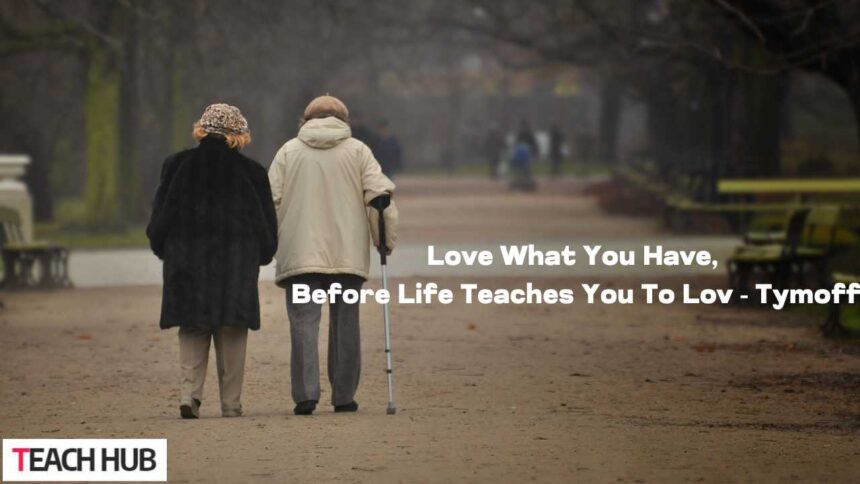In today’s fast-paced, consumer-driven world, we are constantly bombarded with messages to seek more achievements, possessions, and milestones. This relentless pursuit often leaves us feeling unfulfilled and disconnected from the present moment. The wisdom behind the quote, “Love What You Have, Before Life Teaches You to Love What You’ve Lost,” by Tymoff resonates deeply, reminding us of the importance of appreciating what we currently possess.
The solution lies in cultivating a mindset of gratitude and contentment. By focusing on the present and valuing what we have, we can achieve a state of emotional resilience and profound happiness. Tymoff’s teachings provide practical guidance on how to embrace this mindset.
Ready to transform your life through gratitude and mindful living? Read on to discover how you can start loving what you have today and avoid the pain of future regrets.
Understanding the Wisdom Behind the Quote
The quote, “Love What You Have Before Life Teaches You to Love What You’ve Lost,” by Tymoff, carries a profound message about appreciating what we have in our lives. In our quest for more, we often overlook the value of our current blessings. This wisdom encourages us to shift our focus from what we lack to what we already possess, fostering a sense of gratitude and contentment.
Breaking Down the Quote
Breaking down the quote means that we should cherish and appreciate what we have before it’s gone. This could be our relationships, health, achievements, or even the small joys of everyday life. The quote warns us that if we don’t learn to value these things now, we might only realize their importance after we’ve lost them. It’s a reminder to live in the moment and find happiness in the present.
Importance in Contemporary Society
In today’s world, where social media and consumer culture constantly push us to want more, it’s easy to fall into the trap of never feeling satisfied. We are often so focused on acquiring new things or reaching new milestones that we forget to appreciate what we already have.
This mindset leads to constant dissatisfaction and a lack of true happiness. Embracing the wisdom of loving what we have can help counteract these adverse effects, promoting mental well-being and a more fulfilling life.
Supporting Quotes from Tymoff
Tymoff, known for his motivational and introspective content, often emphasizes the importance of gratitude and living in the moment. He says, “Gratitude turns what we have into enough.” This quote supports the idea that appreciating what we have can bring contentment and peace.
Another quote by Tymoff states, “Happiness is not about getting what you want all the time, but loving what you have.” These supporting quotes reinforce the main message and encourage readers to adopt a grateful mindset.
The Profound Impact of Gratefulness on Our Lives
Gratitude has a powerful effect on our lives, shaping our overall well-being and happiness. By appreciating what we have, we can transform our outlook on life.
This simple yet impactful practice can lead to a more content and fulfilling existence. In a world where we are often focused on what we lack, gratitude helps us see and value the abundance already in our lives.
Practicing Gratitude Daily
Practising gratitude daily means making a conscious effort to notice and appreciate the good things in our lives. This can be as simple as keeping a gratitude journal, where you write down three daily things you’re thankful for.
It can also involve expressing thanks to others through a kind word or a thank-you note. By making gratitude a daily habit, we train our minds to focus on the positive aspects of our lives.
Emotional and Psychological Benefits
Gratitude has numerous emotional and psychological benefits. It can improve our mood, making us feel happier and more positive. Studies have shown that people who practice gratitude regularly experience less stress and anxiety.
They also tend to have better relationships because expressing gratitude fosters feelings of closeness and connection. Gratitude enhances our mental health and contributes to a more optimistic outlook.
Real-Life Examples of Gratitude
Real-life examples of gratitude can be seen in many everyday situations. For instance, someone might feel grateful for a friend’s support during a tough time, and they express this by thanking their friend and spending quality time together.
Another example could be appreciating the beauty of nature during a walk in the park, which can lead to feelings of peace and joy. These examples show how simple gratitude can significantly impact our emotional well-being.
Related Concepts and Entities (Mindfulness, Well-being, Mental Health)
Gratitude is closely related to mindfulness, well-being, and mental health. Mindfulness involves being present and fully engaging with the current moment, which naturally complements gratitude practice. Well-being refers to overall happiness and health, which gratitude directly enhances.
Good mental health is the foundation for living a balanced and fulfilling life, and gratitude is a powerful tool for maintaining and improving it. These concepts create a holistic approach to living a happy and content life.
Life’s Harsh Lessons in Appreciation
Life often teaches us the value of what we have through challenging experiences and losses. These harsh lessons are potent reminders to appreciate what we have before it’s too late.
When we lose something or someone important, we suddenly realize their true worth, leading to regret and sorrow. Understanding these lessons can motivate us to live more gratefully and mindfully.
Learning from Loss
When we experience loss, whether it’s the end of a relationship, the passing of a loved one, or the loss of a job, we are forced to confront the value of what we’ve lost. These moments of loss highlight the importance of appreciating the people, opportunities, and comforts we often take for granted. Learning from loss means recognizing the fragility of life and using that awareness to cherish the present and the people in our lives more deeply.
Preventing Regret with Gratitude
One way to avoid the deep regret that comes with loss is to practice gratitude regularly. By actively appreciating what we have, we can prevent the pain of wishing we had shown more love and appreciation when we had the chance. Gratitude helps us to be more present and engaged with our lives, reducing the likelihood of taking things for granted. This proactive approach enriches our current experiences and safeguards us against future regrets.
Tymoff’s Insights on Loss and Appreciation
Tymoff often speaks about appreciating what we have before it’s gone. His insights emphasize that life’s most valuable lessons usually come through experiences of loss and hardship. Tymoff suggests that by adopting an attitude of gratitude and appreciation now, we can avoid the heartache of realizing the value of something only after it’s gone.
He encourages us to express love and gratitude openly and frequently, creating a more fulfilling and connected life. Tymoff’s teachings remind us that the best way to honour what we have is to appreciate it fully in the present.
Digital Well-being in the Age of Overconsumption
In today’s digital age, we are constantly connected to our devices and consume vast amounts of information and content daily. While technology has brought many conveniences, it has also led to the problem of digital overconsumption.
This overuse can negatively impact our well-being, making it essential to balance digital use and mindful living. Understanding and managing our digital habits can help us lead healthier, more content lives.
The Impact of Digital Overconsumption
Digital overconsumption can have several adverse effects on our mental and physical health. Constant exposure to social media and online content can lead to feelings of inadequacy, anxiety, and stress.
It can also disrupt our sleep patterns, reduce our attention spans, and make focusing on real-life relationships and activities difficult. The endless stream of information can overwhelm us, leaving little time for reflection, relaxation, and genuine human connection.
Balancing Digital Use and Mindful Living
Finding a healthy balance between digital use and mindful living is crucial to combating the adverse effects of digital overconsumption. This can be achieved by setting boundaries for screen time, taking regular breaks from devices, and engaging in activities that promote mindfulness, such as meditation, exercise, and spending time in nature.
Prioritizing face-to-face interactions and being present at the moment can also help improve our overall well-being. We can create a more balanced and fulfilling life by consciously managing our digital habits.
Tymoff’s Role in Promoting Digital Well-being
Tymoff significantly promotes digital well-being by encouraging practices that foster gratitude, mindfulness, and contentment. Through his motivational content, Tymoff highlights the importance of appreciating our current blessings and being present.
His teachings remind us to step back from the constant digital noise and focus on what truly matters. Following Tymoff’s guidance, we can learn to use technology to enhance our lives rather than detract from our well-being. His insights provide valuable tools and strategies for achieving a healthier balance between digital consumption and mindful living.
Embracing Contentment Through Mindful Practices
Embracing contentment involves adopting mindful practices that help us appreciate the present and find happiness in what we have. These practices allow us to focus on the here and now, reducing stress and enhancing our overall well-being. Integrating mindfulness into our daily routines can cultivate a more profound sense of satisfaction and peace.
Practical Mindfulness Practices
Practical mindfulness practices are simple activities that bring our attention to the present moment. These include:
- Meditation: Spending a few minutes daily in quiet reflection helps clear the mind and reduce stress.
- Deep Breathing: Taking slow, deep breaths can calm the nervous system and centre our thoughts.
- Gratitude Journaling: Writing down things we are thankful for each day shifts our focus to the positive aspects of life.
- Mindful Walking: Paying attention to the sights, sounds, and sensations during a walk can make us feel more connected to our surroundings.
- Mindful Eating: Savoring each bite and eating slowly helps us enjoy our food and recognize our body’s hunger and fullness signals.
Incorporating Practices into Daily Life
Incorporating mindfulness practices into daily life doesn’t have to be complicated.
Here are some tips:
- Start Small: Begin with just a few minutes of mindfulness each day and gradually increase the time.
- Set Reminders: Use phone alarms or sticky notes to remind yourself to take mindful breaks.
- Combine Activities: Integrate mindfulness into everyday tasks, such as brushing teeth, washing dishes, or commuting.
- Create a Routine: Establish a regular time for mindfulness, such as first thing in the morning or before bed.
- Stay Consistent: Consistency is critical. Practising mindfulness regularly helps make it a natural part of your routine.
Recommended Resources for Further Exploration
For those interested in exploring mindfulness further, there are many resources available:
- Books: “The Power of Now” by Eckhart Tolle and “Wherever You Go, There You Are” by Jon Kabat-Zinn are excellent reads on mindfulness and present-moment awareness.
- Apps: Apps like Headspace, Calm, and Insight Timer offer guided meditations and mindfulness exercises.
- Websites: Websites like Mindful.org provide articles, tips, and resources on incorporating mindfulness into daily life.
- Courses: Online courses, such as those offered by Coursera or Udemy, can provide structured learning on mindfulness practices.
By embracing these mindful practices and incorporating them into our daily routines, we can enhance our sense of contentment and lead more fulfilling lives.
FAQs
What is the meaning of love that you have before life teaches you to love what you lost?
The phrase “love what you have before life teaches you to love what you lost” means appreciating and cherishing your current blessings, relationships, and possessions. It warns that if we don’t value what we have now, we might only realize their true worth after losing them, which can lead to regret and sorrow.
Does the love of your life have to be romantic?
No, the love of your life does not have to be romantic. It can be any deep and meaningful relationship, such as the love for a family member, friend, or even a passion or hobby. What matters is the profound connection and joy it brings to your life.
What is the true love of your life?
The steadfast love of your life is whatever brings you the most incredible sense of joy, fulfilment, and purpose. This could be a person, a calling, or an activity that resonates deeply with you and enriches your existence. It’s something that you cherish and value above all else.
What is the main idea of love of life?
The main idea of love of life is to find joy, contentment, and purpose in your existence. It involves appreciating the present, valuing relationships, and pursuing passions that bring you happiness. Loving life means embracing the good and the challenging moments with gratitude and positivity.
How do you have love in life?
You can have love by cultivating meaningful relationships, practising gratitude, and engaging in activities that bring you joy. Show appreciation for the people and things you have, and make time for self-care and personal growth. Love in life comes from a balanced and mindful approach to living.
What is the purpose of love life?
The purpose of love in life is to create a fulfilling and meaningful existence. Love connects us to others, fosters emotional well-being, and provides a sense of purpose. It drives us to care for and support one another, enhancing our happiness and sense of belonging.
Conclusion
In today’s fast-paced world, it’s easy to overlook what we have while constantly seeking more. The wisdom of “Love What You Have, Before Life Teaches You to Love What You’d Lost” by Tymoff reminds us to appreciate our current blessings. Practising gratitude can improve our emotional and psychological well-being, balance our digital consumption, and embrace contentment through mindful practices.
Take a moment each day to reflect on what you have and express gratitude. Whether through journaling, meditation or simply saying thank you, these practices can help you appreciate the present and prevent future regrets. Start small and be consistent, and you’ll soon notice a positive change in your outlook on life.
We invite you to share your thoughts and experiences with gratitude and contentment. Have you practised gratitude in your daily life? What changes have you noticed? Join the conversation in the comments below and inspire others with your journey towards a more fulfilling and mindful life.
Also Read: // Rivenisnet: Unveiling the Potential and Applications



